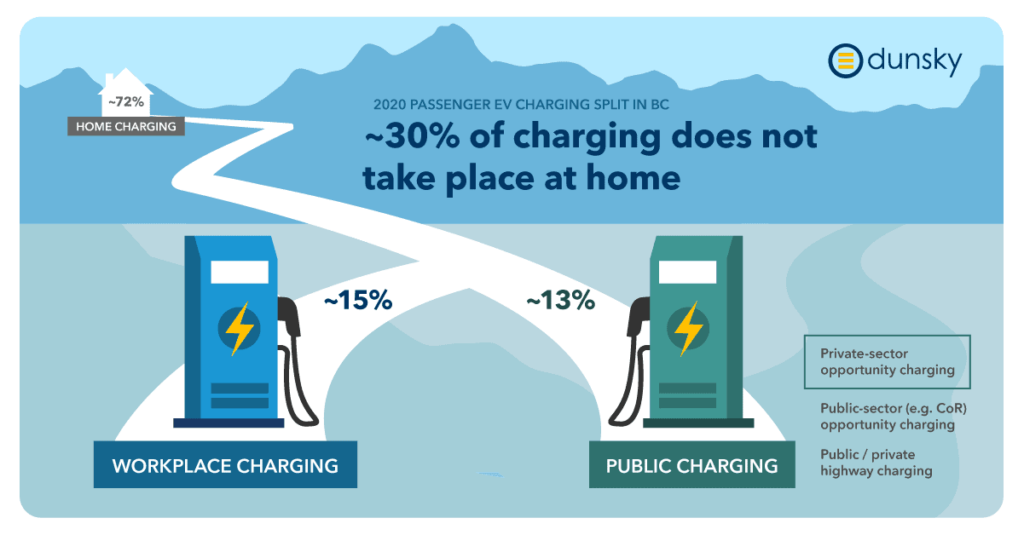EV-Ready Requirements for New Non-Residential Buildings in Richmond B.C.

Challenge: For the city of Richmond, B.C., facilitate appropriate access to EV charging through the development of EV-ready regulations for new non-residential buildings
Solution: Leveraging our team’s prior experience developing EV-ready requirements, we developed several EV Ready scenarios and evaluated them across criterion aligned to the City’s objectives.
Impact: The EV Ready requirements should facilitate easy and convenient charging for the city’s drivers while keeping installation costs low for developers and providing economic benefits for building owners.
Growing the Local Charging Network Coverage
With EV adoption in British Columbia expected to rise significantly in the next 10 years, how can municipalities ensure adequate coverage of charging infrastructure in their territories in ways that are both cost effective for building owners and developers, and convenient for drivers?
Already a leader in EV Ready requirements for residential buildings, the City of Richmond recently worked with Dunsky Energy + Climate Advisors to develop EV Ready requirements for non-residential buildings. These regulations will complement the existing requirements for residential buildings to create a suitable network for charging throughout the City.
Charging in non-residential buildings can be divided into two broad categories:
- Workplace charging: this refers to EV charging in employee parking spaces, where vehicles will likely be parked for longer periods of time. Given the typically long dwell times of this parking, significant load sharing using EV energy management systems (EVEMS) is likely appropriate.
- Opportunity charging: this refers to EV charging at establishments where vehicles are parked for shorter periods (e.g.: retailers, public venues, etc.). Given the shorter dwell times, faster rates of charging are appropriate.
Led by Managing Consultant Brendan McEwen, Dunsky supported the City with research to strengthen their internal knowledge around different charging technologies. We developed multiple EV Ready requirement approaches and assessed them based on the criterion of cost-effectiveness, positive user experience, and ease of administration and compliance.

Our Analysis: Striking a Balance is Critical
Determining the best approach to EV Ready requirements is complex, with numerous factors to consider. Successful EV Ready requirements for non-residential buildings strike a balance between giving drivers enough power to charge up quickly while not providing so much power as to negate the revenue stream for building owners.
Our analysis concluded that a flat rate approach, one which requires a minimum number of parking spaces in a building to be EV Ready, struck the right balance of providing drivers with options and providing building owners with a cost-effective economic model. We also recommended that Level 2 charging be required, and that a certain number of parking spots have the capacity to support even faster DCFC charging.
The City of Richmond leveraged Dunsky’s analysis to develop a proposed zoning bylaw that is currently making its way through City Council.
As EV adoption grows, municipalities will play a critical role in supporting a fast, convenient charging network through initiatives such as EV Ready regulations, as well as more robust collaboration with utilities and the private sector.
If you wish to discuss EV Ready requirements or other EV charging infrastructure questions, please contact info@dunsky.com.
Related Projects
- Read more about California Approves Tariff On-Bill Pilot Informed by Dunsky Analysis
California Approves Tariff On-Bill Pilot Informed by Dunsky Analysis
December 4, 2025
The California Public Utilities Commission (CPUC) has approved Southern California Edison Company’s Tariff On-Bill (TOB) Pilot, authorizing $7.19 million to…

- Read more about Implementing Energy-Efficient Upgrades in Manufactured Homes
Implementing Energy-Efficient Upgrades in Manufactured Homes
August 27, 2025
Manufactured homes are a small segment of the housing stock, but they represent a critical one for achieving a just…

- Read more about Toronto Hydro and Dunsky Help Enable Customer Clean Energy Projects Through Cleantech Services Network
Toronto Hydro and Dunsky Help Enable Customer Clean Energy Projects Through Cleantech Services Network
July 3, 2025
Barriers to undertaking clean energy projects are not just financial. A significant barrier for residential and commercial building owners to…
